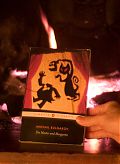
Mikhail Bulgakov
The Master and Margarita
Drifting through the internets I caught hints of his name: Bulgakov, always followed by The Master and Margarita. Vague flavors of this book mentioned but rarely revealed. (You can find many neat diagrams if you go looking.) This book was rare in that I had no clue of what to expect. A surprise. A delightful surprise! And so dear reader, I too will refrain from telling you too much. This is a book to read for yourself.
The Master and Margarita was written during the “darkest days of Stalin’s regime.” Equally comical, fantastical and serious, I haven’t read such an imagination bender in a long time. Neither have I read a book so truthfully funny. That the devil is a main character is always a seller, as is the intermittent and well-woven in story of the procurator, Pontius Pilate.
This is a book to teach comedy, its value and how it works. The satire is brilliant, so clever, so that one picks up the meaning of Communism’s repressive thinking without knowing how it has been done. Some of my favorites were the Massolit and Dramlit houses of literary repute. I could feel Bulgakov’s scathing indignation for these organized dictators of written works. And they even required identification cards, just to enter the building:
“Your identification cards?” the citizeness repeated.
“My sweetie….” Koroviev began tenderly.
“I’m no sweetie,” interrupted the citizeness.
“More’s the pity,” Koroviev said disappointedly and went on: “Well, so, if you don’t want to be a sweetie, which would be quite pleasant, you don’t have to be. So, then, to convince yourself that Dostoevsky was a writer do you have to ask for his identification card? Just take any five pages from any one of his novels and you’ll be convinced, without any identification card, that you’re dealing with a writer. And I don’t think he even had an identification card! What do you think?” Koroviev turned to Behemoth.
“I’ll bet he didn’t,” replied Behemoth…
“You’re not Dostoevsky,” replied the citizeness…
“Well, who knows, who knows,” he replied.
“Dostoevsky’s dead,” replied the citizeness, but somehow not very confidently.
“I protest!” Behemoth replied hotly. “Dostoevsky is immortal!”
“Your identification cards, citizens,” said the citizeness.
Yes, in writing about The Master and Margarita, less is best. Let Bulgakov speak for himself.
· · · · · · · · · · · · · · · · · · · ·